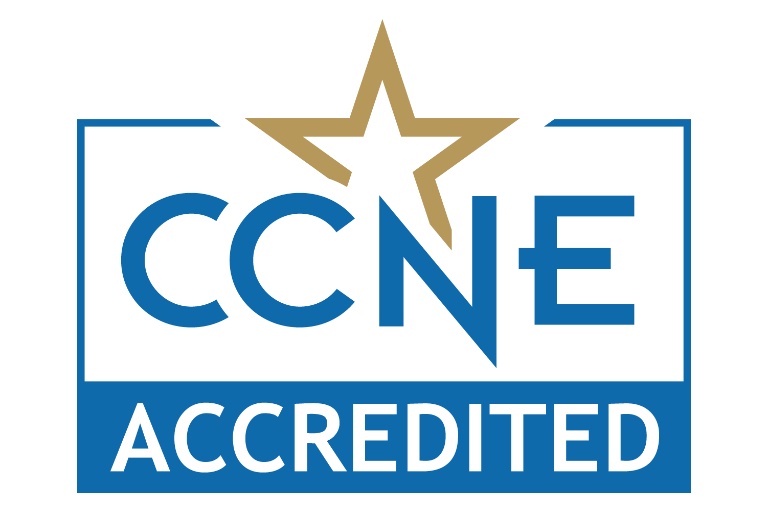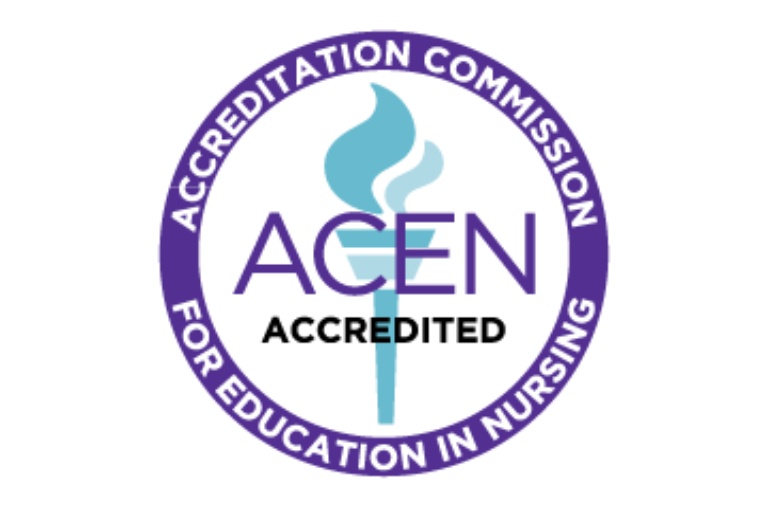BSN Program BSN Accreditation
BSN Accreditation
The School of Nursing of the Indiana University Kokomo School of Nursing & Allied Health Professions is approved by the Indiana State Board of Nursing; additionally the Baccalaureate Degree in Nursing program is accredited by the Commission on Collegiate Nursing Education (CCNE). In 2020 the program earned a full ten-year reaccreditation (2020-2030). Being accredited means that verifiable steps have been taken by the school to assure that you receive a quality education. Graduating from an accredited school of nursing means that your credits should transfer more easily if you should choose to pursue another degree and potential employers will have confidence that you received a quality education.
All faculty in the School of Nursing and Allied Health Professions have at least a master's degree-approximately 51% have doctorate degrees, and another 10% are actively pursuing doctorates. Several have specialty certifications.
Mission
The mission of the Indiana University Kokomo School of Nursing and Allied Health Professions is to provide innovative and effective student learning opportunities, preparing students for various professional roles through undergraduate and graduate programs. The school fosters the delivery of safe, patient-centered, and evidence-based healthcare by collaborating with other professionals, promoting ethical professional behavior, leadership, scholarship, civic engagement, and lifelong learning.
Vision
The Indiana University Kokomo School of Nursing and Allied Health Professions strives to be a school of choice for health professions students offering transformational learning experiences that develop innovative leaders in a vibrant learning community.
BSN Program Learning Outcomes
The IU Kokomo BSN graduate will meet program learning outcomes and embody them in their professional practice as a nurse who is:
- a critical thinker who demonstrates intellectual engagement and uses evidence as a basis for clinical reasoning and decision making.
- a culturally sensitive individual who provides holistic individual, family, community, and population-centered nursing care.
- a knowledgeable care coordinator who facilitates access to resources across the continuum of healthcare environments in order to meet the evolving health care needs of individuals, families, communities, and populations.
- an individual who understands and considers the impact of health care policy, finance, and regulatory environments on care delivery.
- an individual who embodies the professional identity of the nurse and who translates the inherent values of the nursing profession into the ethical and legal practice of nursing.
- an effective communicator who collaborates with interprofessional team members, patients, and their support systems for improved health outcomes.
- a competent care provider who is prepared to practice to the full capacity of the professional nurse role in diverse healthcare environments.
- an accountable leader and manager who applies principles of systems and organizational processes and who balances resources to promote quality care and patient safety.
- an individual who embraces and employs innovations in information management and technology in the delivery of quality patient care.
For complaints regarding the BSN program please contact either the Commission on Collegiate Education (CCNE) and/or the Indiana State Board of Nursing.
2023 BSN Program Assessment Report
MSN Program MSN Accreditation
MSN Accreditation
The Master of Science in Nursing (MSN) program at Indiana University Kokomo School of Nursing & Allied Health Professions located in Kokomo, Indiana is accredited by the Accreditation Commission for Education in Nursing (ACEN), 3390 Peachtree Road NE, Suite 1400, Atlanta, GA 30326, 404-975-5000. In 2019 the program received a full eight-year reaccreditation (2019-2026). View the public information disclosed by the ACEN regarding this program at their website.
MSN Program Learning Outcomes
The IU Kokomo MSN graduate will meet program learning outcomes and embody them in their professional practice as a nurse who will:
- model excellence in nursing leadership to improve nursing practice within a complex healthcare system.
- conduct advanced nursing practice within ethical-legal guidelines, professional policies and regulations, and standards of practice associated with a specialty area of practice.
- synthesize knowledge from nursing as well as biological, behavioral, social, administrative, educational, and communication sciences for application to a chosen domain of advanced practice nursing.
- demonstrate scholarly inquiry and reflection that exemplifies critical, creative, and systems of thinking to advance the practice of nursing.
- frame problems, design interventions, specify outcomes and measure achievement of outcomes while balancing human, fiscal, and material resources.
- use information technology and knowledge-based resources to manage transform data that inform clinical practice.
- systematically apply evidence from research findings to answer clinical questions, solve clinical problems and develop innovative nursing interventions and health policies for selected patient populations.
- demonstrate the collaborative practice and interpret nursing science within an interdisciplinary context.
- articulate the effects of culture, diversity, values, and globalization in the design, delivery, and evaluation of health services.
- engage in lifelong learning activities that contribute to professional nursing development as well as to the advancement of nursing.
2023 MSN Program Assessment Report


 BSN Accreditation
BSN Accreditation  MSN Accreditation
MSN Accreditation